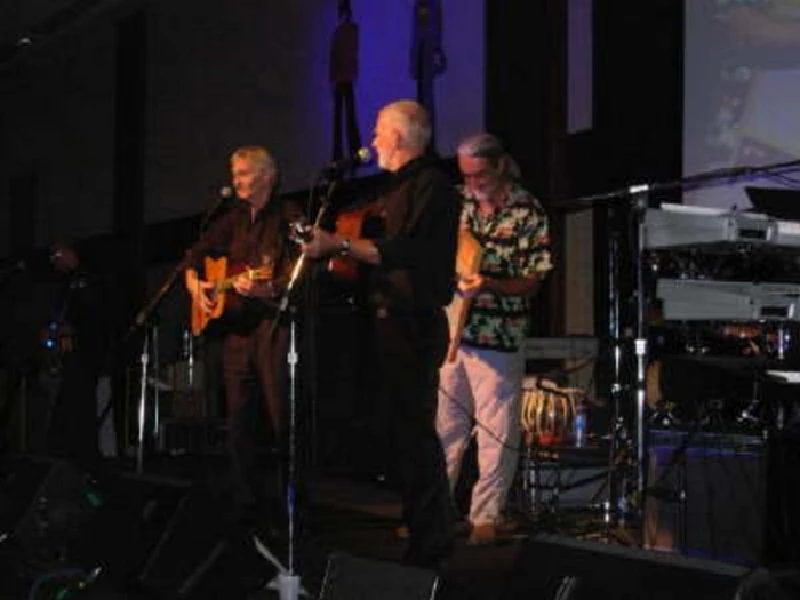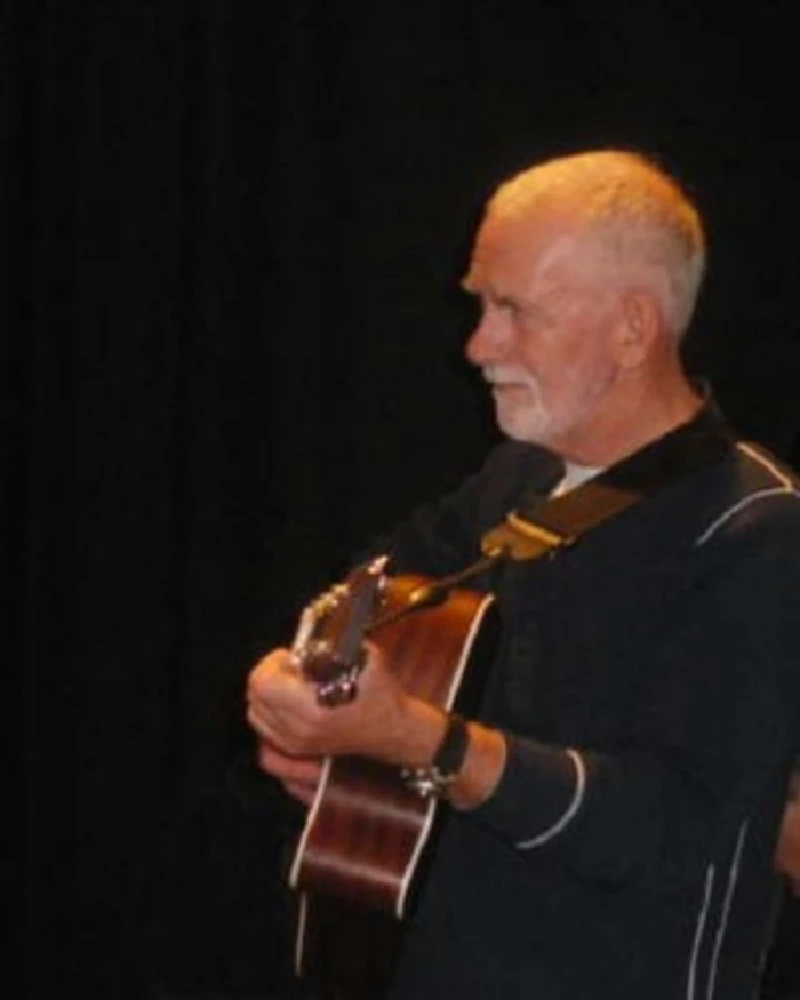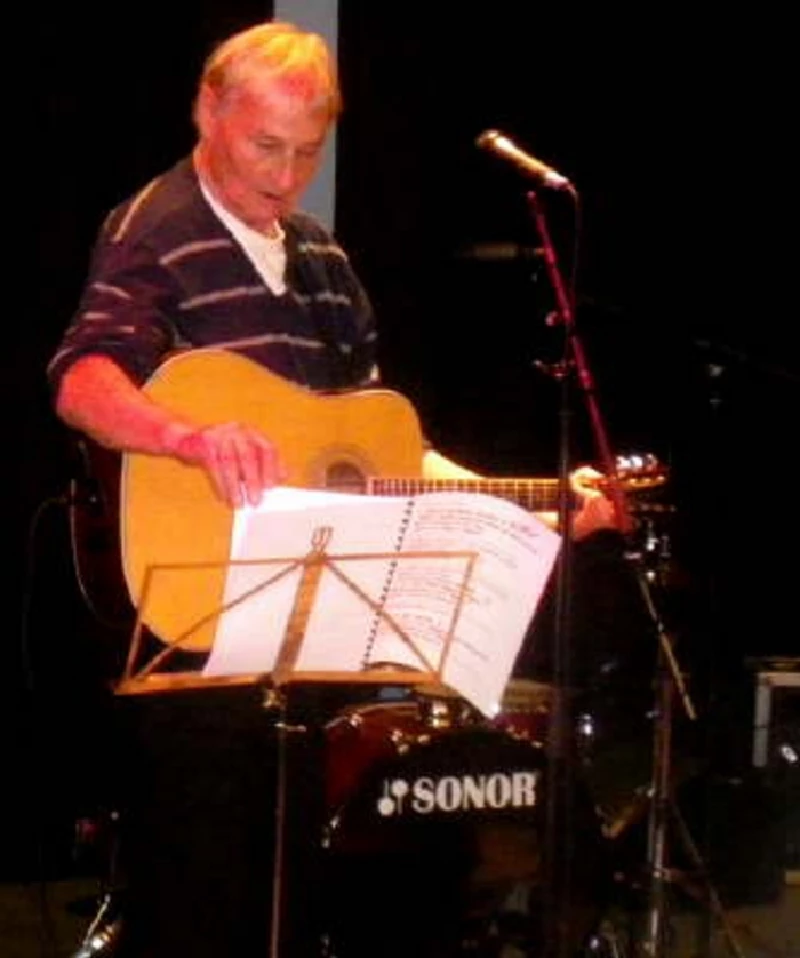TBA (Aka Natalie Beridze) - Music Box Theatre, Chicago, 3/10/2010
by Lisa Torem
published: 6 / 10 / 2010

intro
To coincide with a screening of John Lennon biopic 'Nowhere Boy', Lisa Torem at the Music Box Theatre in Chicago sees Lennon's first band, the Quarrymen, play an enjoyable set of early rock and roll and skiffle numbers
All my life I’ve been “one away” from Paul, John, George and Ringo. I was there when our Chicago mayor handed the key to the city to Yoko Ono when she showed up to exhibit a collection of John Lennon’s art. I had met Pete Best, often referred to as “the fifth Beatle, and his band, several times and, most recently had an opportunity to watch and converse with Colin Hanton, Rod Davis and Len Garry, members of the band that would eventually morph into the Beatles, the Quarrymen. I realized, however, during this evening, that being “one away” should never be taken lightly, especially when you recognize that those surrounding the Beatles legacy were pretty special in their own right. On this evening, our local art theatre, The Music Box, was screening UK director Sam Taylor- Wood’s biopic, 'Nowhere Boy', which focused on an intriguing angle of John Lennon’s life; those years leading up to the Beatles Hamburg clubbing sessions; the gruelling groundwork which honed the lads’ skills as they played sets late into the night for two years, before arriving back to Liverpool and realizing international stardom. The film also cast a keen eye on Lennon’s troubled past; that raging, relational dichotomy he experienced, according to the script, of losing his biological mother Julia and co-existing with the less free-spirited, but more stable and strict Aunt Mimi. The theatre was ghastly quiet when the film began as it was packed with devoted fans; some baby boomers were dragging teenaged sons (who didn’t look the least beat agitated, actually). Our resident Beatles expert and media personality, Terri Hemmert, invited questions from the audience once the film ended. “Unlike a lot of films, they did it right,” Hemmert commented, between queries. The three touring Quarrymen, who had played together forty years earlier, then gotten back together to record two albums and regroup for touring engagements, were here tonight to commemorate Lennon’s 70th birthday. They would continue this film-screening, live concert theme until October 9th, where they would end up in New York City for a final concert, joined by the likes of producer Mark Hudson, folk icon Pete Seeger and many others. Quite comfortable on stage, each musician seemed honestly delighted to field the questions. They also seemed taken by the theatre’s ambience. The Music Box was created in what is termed in architectural lingo, as “atmospheric.” Twinkling stars are set high in the ceiling and dreamy, fluffy-white clouds float above, too. A plush, red curtain separates the audience from the stage. Drummer Hanton exclaimed, upon seeing it, “The last time I saw a curtain like that I was saying goodbye to my grandmother.” Regarding the portrayal of the younger versions of these Quarrymen, in the film, guitarist/vocalist and original Quarrymen banjo player, Davis, lamented, “I was disappointed Brad Pitt couldn’t play the banjo!” The band members refused to be taken too seriously at any point of the evening and even after a standing ovation Davis quipped: “I know how you feel. Those seats are really uncomfortable.” When asked about his entry into the band, as the key percussionist, Hanton, wearing a charming, poker-face, simply said, “They knew I couldn’t play because I had only bought it {the drum kit}a day before.” Garry, who after leaving the band, ultimately became an architect, had the persona of a maestro:” I’m here just to sing some Elvis songs,” he said convincingly. The band launched into a highly, energetic set of Elvis covers, early rock and roll, traditional American standards and, to the delight of the spectators, “skiffle music,” which is a style brought to the fore by UK musician Lonnie Donegan. It predominately involves an infectious, upbeat tempo, basic instruments like the washboard and the “tea-chest bass”, guitars, banjos and sometimes violins. Almost washed out in the States, it was given new life in the UK, by Donegan, who inspired young, post-war musicians like the Quarrymen in the late 50s Dressed in black, true to the earlier days, Garry and Davis exchanged vocal solos and blended harmonies. They opened with ‘Mean Women Blues’, a highly- charged, blistering repast. ‘Rock Island Line’ has a consistent chug feel, as expected from a refrain about a popular train route, and the band modernizes this “talking-blues” with a vivacious instrumental facelift. ‘That’s Alright’ was played with vigour and was well appreciated. Though, the Presley version is familiar to most, this more unproduced sampling, cut to the chase, with a biting bass and slick backbeat fastidiously kept up by Hanton. Davis languished some particularly virtuosic passages on lead guitar. During ‘Worried Man’s Blues’ audience members were asked to participate; three attendees eagerly plucked away at the makeshift bass and briskly strummed thimble-covered fingers across the antiquated washboard. I, personally, had never experienced, ‘You’re Right, I’m Left, She’s Gone’ which brought out great vocals from Garry and more extroverted guitar twangs from Davis. ‘Come Go With Me’ warranted a real taste of the early Beatles feel. A tribute to the “late, great” Buddy Holly, ‘That’ll be the Day’ was spunkier still. ‘In Spite of all the Danger’ had been performed earlier during the film. It was the most memorable ballad of the evening; bittersweet and pure in its youthful lyric. The guest stand-up and brawny bassist, Wayne Hartel, dressed to the nines like a Texas cowboy, shined in ‘Long, Long, Long, Long.’ The harmonies of ‘Blue Moon of Kentucky’ and the staccato rhythms of ‘One After 909’ were of great contrast, straddling bluegrass against the best of early rock. Another tune, widely acknowledged in the film, and a Quarrymen favorite, was the character-driven ‘Maggie May.’ “They’re taking her away/She’ll never walk on High St. anymore…” It’s a song with, apparently, a much-deeper, back story. It was difficult not to smile hard during their rousing ‘Blue Suede Shoes.’ But, when the band did their first encore, the wistful ballad, ‘In My Life,’ with Garry nursing the microphone, and whispering to each and every member of the intimate room, a flood-like impermeable sense of cultural history, washed over the theatre. The audience grabbed the chance to respond in kind when Garry pointed the mike in their direction. “Some are dead and some are living/In my life I loved them all,” was the salient sentiment which meant more tonight, within these hallowed walls, than at any other time in the past. Suddenly, it had all became exceedingly clear. We were no longer simply “one away.” We were one.
Picture Gallery:-


interviews |
|
Interview (2010) |
| The Quarrymen was the first group of John Lennon. Banjo player and founding member Rod Davis speaks to Lisa Torem about the group's skiffle influences and Lennon |
most viewed articles
current edition
Carl Ewens - David Bowie 1964 to 1982 On Track: Every Album, Every SongArmory Show - Interview with Richard Jobson
Colin Blunstone - Thalia Hall, Chicago, 16/7/2025
Visor Fest - Valencia, Spain, 26/9/2025...27/9/2025
Bathers - Photoscapes 1
John McKay - Interview
Loft - Interview
Robert Forster - Interview
Billie Eilish - O2 Arena, London, 10/7/2025
Sir Tim Rice - Interview
previous editions
Heavenly - P.U.N.K. Girl EPManic Street Preachers - (Gig of a Lifetime) Millennium Stadium, Cardiff, December 1999
Beautiful South - Ten Songs That Made Me Love...
Oasis - Oasis, Earl's Court, London, 1995
Pixies - Ten Songs That Made Me Love...
Boomtown Rats - Ten Songs That Made Me Love....
Peter Perrett - In Dreams Begin Responsibilities Interview Part One
Prolapse - Interview
Trudie Myerscough-Harris - Interview
Coldplay - Wembley Arena. London, 16/8/2022
most viewed reviews
current edition
Amy Macdonald - Is This What You've Been Waiting For?Sick Man of Europe - The Sick Man of Europe
Phew, Erika Kobayashi,, Dieter Moebius - Radium Girls
Lucy Spraggan - Other Sides of the Moon
Davey Woodward - Mumbo in the Jumbo
Alice Cooper - The Revenge of Alice Cooper
Bush - I Beat Loneliness
Suzanne Vega - Flying With Angels
Blueboy - 2
Cynthia Erivo - I Forgive You
Pennyblackmusic Regular Contributors
Adrian Janes
Amanda J. Window
Andrew Twambley
Anthony Dhanendran
Benjamin Howarth
Cila Warncke
Daniel Cressey
Darren Aston
Dastardly
Dave Goodwin
Denzil Watson
Dominic B. Simpson
Eoghan Lyng
Fiona Hutchings
Harry Sherriff
Helen Tipping
Jamie Rowland
John Clarkson
Julie Cruickshank
Kimberly Bright
Lisa Torem
Maarten Schiethart